He was a science teacher, a man of faith, and a choir director who had a gift for creating rich, musical harmonies
IT WAS A Saturday afternoon, and the new School Quartet I was helping to create was practicing in the basement of John Henry Miller’s home in Hartville, Ohio. My classmate, Marlin Miller — who would eventually become my best friend — was trying to direct us.
To three squirrelly freshmen, ping pong looked more interesting than music. Things weren’t going very well, and we should have been worried. We had a performance tomorrow night at church.
We were a new group trying to sing a cappella. At this moment, Marlin was focused on helping me. I couldn’t see the value in sight-reading music. Until then, I had gotten along just fine harmonizing, or grinding out the melody. That’s the way I had always sung with my family. Why couldn’t I just blend in?
But Marlin was stubborn, insisting that I actually learn the notes as they were written.
Suddenly, we heard rapid feet on the basement stairs, and John Henry Miller appeared. Ruggedly handsome with a full head of wavy, black hair, John Henry was a supreme diplomat. He was quick on his feet, both mentally and physically, but his charm disguised a will of titanium.
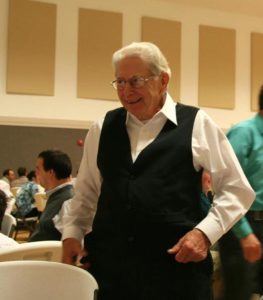
When John Henry set his mind to something, people simply folded. He taught middle school students — Earth Science, no less. He did this with a combination of hard work and humor, and he riveted students with his stories. His opening lecture each year at the Field Local Schools had his students on the edge of their seats with laughter and fascination.
The speech was so popular, former students returned to hear him give it.
Having an adult enter the fray got our attention. We turned toward John Henry, who was carrying an ancient book, Coleman’s Songs for Men.
“Here’s a song that would work for you,” he enthused. “Let’s try this.”
We stood around him, looking at song #38: “I Want My Life To Tell.”
Amid life’s busy, hurrying throng
The gay, the sad, the weak, the strong,
While I am traveling along,
I want my life to tell for Jesus.
Turns out the song was easy to learn, primarily because the notes build like steps, the first six words on one note, the next four words the next note up, and so on.
It was ridiculously simple, and suddenly, we recaptured the blend we had shown during our first performance several weeks before. The moment restored our confidence.
All except for one of us.
I glanced over at Marlin, who met my eyes. To my surprise, I realized — thanks to an instinctive connection that would make us friends — that he hated this. He was angry, hurt. John Henry had bowled into his son’s new musical group, pushed him aside, and simply taken over.
The next week, we met somewhere else to practice.
UNLIKE MARLIN, I had had a very different reaction to John Henry. I was grateful for his attention.
I knew all about John Henry from the stories of my three older sisters, who worshipped him, calling him “Henny.” He was the director of The Hartville Singers, a church choir that toured across the United States and Canada. John Henry knew my family’s kinetic energy, our high emotional reactions. He encouraged the singing talent my siblings shared.
In many communities, playing sports is the path to acceptance and popularity. That was true in ours, but our community also had another route. Our congregation was known among Mennonites for our musical skills. And because of our peculiar love for a cappella music, singers who could hold their own were in high demand.
This was to a large extent due to John Henry’s leadership. As the choir director, he had the power to decide who sang in small groups or solos, and who just sang in the choir.
Over the next few years, I found myself performing in various ensembles. John Henry took a keen interest in my musical skills, teaching me to sight-read notes. Not as good as his son, who had been reading notes since babyhood, but good enough.
Between the rehearsals and youth group activities, I spent a lot of time at John Henry’s home. Marlin and I became best friends. At one point or another, I developed a crush on each of his sisters. Marlin’s mother Kathryn — a gentle woman with a quick, high musical laugh and the kindest eyes I’ve ever seen peering beneath her blonde hair and white head covering — even played the role of surrogate mother to me.
I deeply admired the Miller family.
Although my father had a high school diploma, John Henry had a college education — in fact, he had his Masters degree in Geology from Franklin and Marshall University in Lancaster, PA. This meant my father could only find work in factories, while John Henry got paid a salary for teaching in a public school. He had the summers off. It meant that the Millers didn’t have financial problems.
My family thought vacation meant visiting relatives out of state — during which my father often got migraine headaches, probably due to the pressure of debt — while Marlin’s family went on fishing and swimming vacations in Canada.
John Henry was also famous. When the State of Ohio passed a law requiring all teachers to join the teacher’s union (since they all profited from the bargaining work of unions), John Henry refused to join. He didn’t have much of a choice — our church did not permit its members to join unions, due to its history of violence.
So his Field Local Educators Association, the local chapter of the Ohio Educators Association and the NEA, took him to court. The National Right to Work Legal Defense Foundation, “a nonprofit, charitable organization,” provided his legal defense free of charge, giving him a voice. They won the case.
The story made the headlines of the Akron Beacon Journal.
Afterwards, John Henry chortled, an association board member told him, “We should have known better than to use you as a test case. Never go up against an Amish man on religion.”
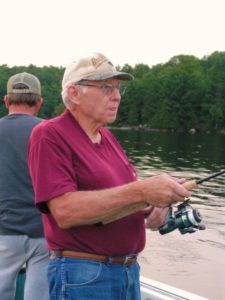
I REMEMBER ONE night, in particular, driving home from a choir concert. A group of young men were all in a van. John Henry was driving, and another public school teacher in our community, Roy Gingerich, was riding shotgun.
Between John Henry and Roy — both excellent storytellers who led The Hartville Singers together — my friends and I had little to say, except perhaps the occasional question. That night the talk turned to teaching.
Roy taught in a one-room schoolhouse in Holmes County, Ohio — a rural, public school where only Amish students attended. John Henry taught in a suburban middle school. He expounded each day on the wonders of Earth Science, a course which included basic evolution. He was in a public school, which meant he couldn’t proselytize (ironically, he also served on the school board of our church’s parochial school, even chairing it).
In other words, both men were Christians living in the World. Things were not black and white.
Battle-scarred, classroom veterans, they could both tell stories — and almost every story got a roar of laughter from the group. I sat there, spellbound.
I was almost 17, thinking about my own future. Within the next year, my sister Rose would suggest that I might make a good teacher. As I listened to these two men who told stories like most Mennonites swung a hammer — nailing their target every time — a deep desire welled up in me.
I wanted to be the kind of teacher who could tell stories like Roy and John Henry.
AFTER WE GRADUATED from high school, our School Quartet evolved into The Harvesters. We were past the coaching John Henry could offer. By then, Marlin was creating original arrangements for the quartet from popular Christian Rock songs.
Together, we arranged a tour to the New England states and produced our first cassette album, with my friend handling the musical direction and me handling the royalties. The piece sold well. I thought about a career in music. I thought about going to college. But when I graduated high school, my father was dead-set against my plans.
“The family needs the money you’re bringing in,” he told me, tears in his eyes. By then, I was doing construction work for a local mason who attended our church.
John Henry encouraged me to consider college, but he also supported my father. He thought taking time off school was a good idea. When I left construction work briefly to work the night shift at a local nursing home — stripping wax from the floors, waxing and buffing them, night after night — he urged me to go back.
“Mastering a trade — like bricklaying or carpentry — is important,” he noted. “You never know when you’ll hit difficult times, and need to return to it.”
Three years later, I was invited to teach at a Conservative Mennonite parochial school out in Phoenix, AZ. No college degree needed, just that I was Conservative Mennonite. I would manage children and grade their workbooks. I would start the day I turned 20.
Our youth group gave me a farewell send off. My father and mother decided I was doing mission work, and God was leading me to teach — fortunately, my younger brother Dave had begun to work and was helping out with the family’s expenses.
But the best advice I received came from John Henry.
When I stopped by at their house to say goodbye, Kathryn served me a bowl of strawberries and vanilla ice cream while John Henry charged me with the classic “Don’t smile ’til Christmas” advice for teachers. I was to start out tough. Once kids understood I was in charge, I could loosen up. But being the storyteller he was, John Henry set the scene.
“On the first day of class,” he told me, “I always arrive late for class. Let ‘em wonder. I stand in the door and look at them, don’t say a word. Just stare at them.”
His advice worked. My first year of teaching went well, and I was asked to return.
But by then, I was ready to return to Ohio and begin working on a degree in music at a local community college. I could support myself by teaching high school — I had been offered a job at my alma mater, where I had graduated three years previous.
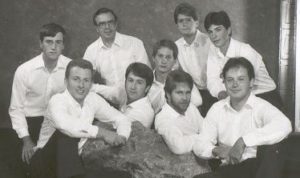
I intended to direct choral groups, just like John Henry did.
Perhaps the first hint that I was not cut out for the conductor’s baton came when I brought home a taped recording of the school Christmas program I had directed. I was proud of the work my high school students had done. So I brought it over to play to my mentor when I first visited Marlin.
John Henry listened to the tape. My enthusiasm tapered a bit as I saw amusement flickering in his eyes. He leaned forward.
“You hear the fella down in the gutter?”
I listened closely, and for the first time, I did. One of my students was singing slightly off-key. Okay, actually it was pure monotone. Barely there, but definitely there. How could I not have heard him?
“I think someone got lost down there,” John Henry commented wryly.
I BROUGHT SOMETHING else home with me when I returned from Phoenix.
Fundamentalism.
The conservative community where I had taught had begun to foster a deep distrust of science within me. I remember in particular a small book I had picked up disproving evolution. It was written in easy-to-understand English. It poured scorn on the idea that a fossil could be millions of years old, when clearly the earth had been created only 6,000 years ago, based on the biblical records.
Written by a Baptist minister, the book showed with stunning clarity the circular reasoning evolutionary scientists use to date fossils. How could they know a fossil was millions of years old? How could anyone prove that?
Enthusiastically, I showed the book to John Henry.
My mentor flipped his way through it, pausing here and there to read. I knew he faced the issue of evolution as a science teacher. I knew he took pains to present both the classic evolutionary view and the alternate view that God was the author of creation. But perhaps he would find the author’s arguments helpful.
To my surprise, I heard John Henry chuckle. By then, he had reached the end of the book.
“Did you notice there’s not a single source listed?” he asked me, paging backward. “Not a single quote from an evolutionary scientist. Has this writer even taken an evolutionary science class? I suspect not.”
My mouth dropped open.
“Is that important?” I asked.
It would be years before I gained my B.A. Before I learned the importance of peer-reviewed research. Before I saw the rigor that trained scientists used in their quest for the truth.
Only then did I realize my question’s profound ignorance.
I SOON FOUND that a degree in music was not for me. The fact that I didn’t play a musical instrument, not even the piano, made it difficult to understand even the most basic music theory. I sight-read badly. Most importantly, I found practice boring. I noticed the lyrics in a song, not its musicality. The hours I would need to spend mastering an instrument or reading music looked insurmountable.
Meanwhile, my upper-level courses in writing and literature — classes my musical peers found deadly dull — were utterly fascinating.
One night during a rehearsal, John Henry needed to change the lyrics to make them more appropriate for church services. He turned to me, and in minutes, I had rewritten the song.
It was then I realized, I think, that I was in the wrong major. Whereas I struggled to read or compose musical notations — desperately stalling in music theory — following the notations of the English language occurred instinctively, and I quickly discovered the harmonies buried in words.
WHAT I TOOK most clearly from John Henry was his pragmatic nature.
Yes, there was a certainty to his convictions, a powerful will that guided his decisions. But he also saw no dissonance between his belief in God and his adherence to scientific principles that governed God’s creation. He modeled the type of Christian I wanted to be.
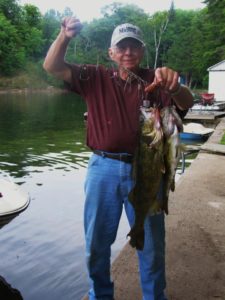
I remember a conversation we once had in front of the family fireplace. John Henry was reminiscing to Marlin and me about his college days at Eastern Mennonite College, where he and some of his Conservative Mennonite peers attended. Many of those peers, including his older brother David, had left the Conservative Mennonite church.
But John Henry didn’t seem bitter about it.
“I think we all make choices about what kind of lifestyle we choose to live,” he noted, glancing over at me as if trying to read my reactions. “No, you don’t need to be a Conservative Mennonite to be a Christian, to go to heaven. That’s not why I remained.”
The room was silent. I realized Marlin’s two younger sisters had entered with popcorn and Kool-Aid. His mother Kathryn was still in the kitchen.
“Why did you remain?” I asked. By then, Marlin and I were members of our church by habit only. In a few months, I would be gone, headed to London to study literature, history, and the theatre.
“I chose to remain because of the world I wanted for my family,” he said. “There’s a lot to be said for this kind of protection, this kind of innocence. No, it’s not perfect, and young people sometimes react to it. But if you’re going to raise a family, it has its advantages.”
Perhaps he was just trying to be empathetic. But I remembered that conversation years later when I stood in the Tacoma Dome here in Washington State at a job fair, talking to the human resources director of an island school district. Eventually, they would hire me.
“Kids can play in the yard, drive their bikes around town,” she told me. “It’s a safe place to raise a family.”
Perhaps the decisions I made about where my family should put down roots weren’t all that unusual. The politics of my current world is Progressive, which appears to be the opposite of my past.
But maybe not.
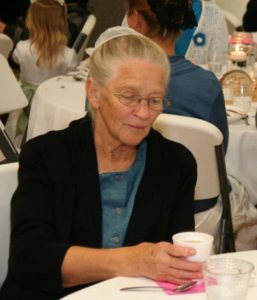
JOHN HENRY IS one of my great soul teachers because he modeled during my teen years how I want to think about and practice my faith. Instead of taking extreme positions, twisting science to fit his interpretation of the Bible, he offered an open-minded approach to education and to life, one that balanced both sources of wisdom.
Although he was a leader in our community, his educational path offered me an alternative to our community’s black-and-white approach.
“Science isn’t a threat to the Bible,” he once said to me. “Scripture offers insight for life in spite of the culture within which it was written.” As I pursued my education and left my community to enter the World, my experience affirmed his explanation.
As a scientist, John Henry believed the world operated according to natural principles God established when he set Creation into motion. The hows and whys didn’t matter.
This patient, reasonable approach John Henry took towards life was shaped by his college experience at Eastern Mennonite College, which was a more conservative institution when he attended there. The power and pragmatism of his faith shaped the life decisions he made, the way he built our community, the way he nurtured his family.
His home was a safe space that drew me in.
JOHN HENRY JUST turned 79 in January. He is still going strong, living near Hartville with his wife, occasionally directing The Hartville Singers (but he’s “had to step aside to make room for younger directors.”).
Due to repeated neck injuries, he’s had to slow down. Sometimes he asks the grandchildren to help him when doing work around the house. But mostly, he’s just too stubborn to quit.
I last visited John Henry and Kathryn in August 2016 when I was in the area to settle my father’s estate. Dropping by to meet Marlin, I had a brief opportunity to say hello to this second set of parents who made such a dramatic impact on my life.
As welcoming as always, they invited me to stay for dinner, but a prior commitment made it impossible for me to stay.
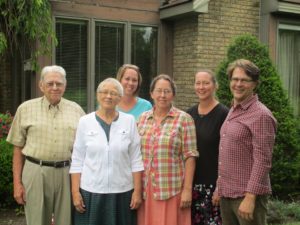
A CERTAIN PERFORMANCE hovers in my memory.
It was during a Sunday morning concert, and John Henry had decided that his family should perform immediately after the offering, midway through the service.
I watched them gather around the pulpit on the platform. The room grew still, hushed. And then, the clarion sound of a pitch pipe.
The group’s sound was rich and full, easily matching the choir in volume and depth.
What a friend we have in Jesus,
Take it to the Lord in prayer.
The family was focused, John Henry directing with his powerful baritone, the other three parts coalescing around it. There was power in the harmony, coming out of the blood connection shared by each member. That connection gave a rich meaning to the words.
And then suddenly the song shifted away from the familiar hymn— there was a brief pause, followed by a clear, high soprano voice above the gentle, three-part humming voices of the lower notes.
Now dear Lord as we pray, take our hearts and minds far away
From the press of the World all around, to thy Throne where Grace doth abound.
The song cut to the core of John Henry’s faith. Within the world of the Conservative Mennonites — following the faith’s principles of community and peace — he and Kathryn had created a home where God was honored, where peace was valued. The simplicity of their a cappella music displayed this gentle faith most clearly.
May our lives be transformed by thy Love, may our souls be refreshed from above,
At this moment, let people everywhere, join us now as we come to Thee in prayer.
Mentally, I compared, as I often did, the steadiness of John Henry’s family — to the more emotional, frenetic nature of my own. It was an approach I wanted to follow in my own future.
How often when on weary ways, how oft on mountains bare,
How often after tiresome days, we need a night of prayer.
As I listened to them, I suddenly recalled a moment from my past.
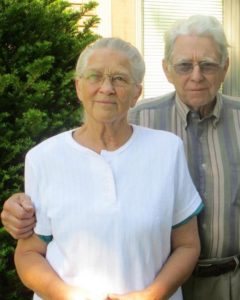
IT WAS LATE at night, the choir returning home from a tour, the bus thundering down the highway toward home. Restless, I walked up the aisle, approaching the front of the bus. Ahead of me, I saw John Henry and Kathryn, their bodies bent slightly over a Bible sitting open in front of them. The pages were lit by the dim glow above their seats. As I drew closer, I heard one of their voices murmuring in prayer.
Me, I was too jittery, too wound up by the concert and by the presence of the group, to sleep. I was looking for company, people who still wanted to talk.
I glanced to the front of the bus, toward the cockpit. The driver’s face was faintly lit by the dashboard, his eyes measuring the black road stretching ahead through the large windows of the Greyhound.
Around me, bodies slumped in sleep.
I turned and headed back to my seat, thinking about what I had seen. The prayer I had witnessed was not a unique event. It was a nightly ritual, a meaningful connection forged between two souls and their Divine Protector.
NOW, LISTENING TO John Henry’s family perform, I soaked in the rich, musical harmony, the talent shining through the controlled shape of their music, the grace notes that floated above the deep timbres of the alto and bass.
And I found myself blinking back tears.
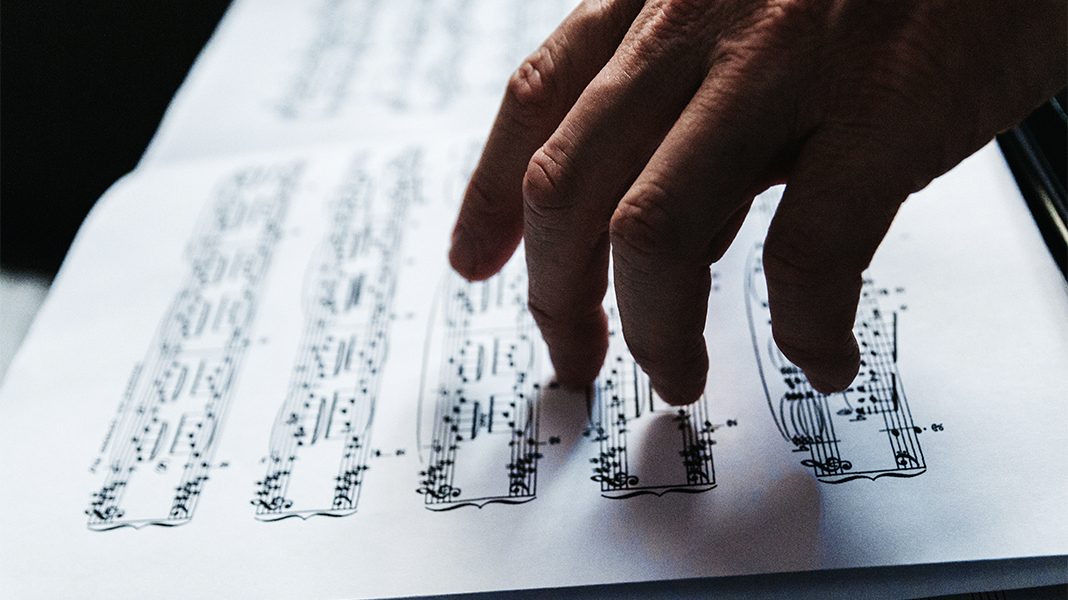

I’m impressed with your memory, Steve! A gracious and lovely expression of my family and my dad: thank you very much! How could you not be facinated with such a guy? I say this in full admiration of him, too!
Let me share your articles…!
much, Marlin
Hi Marlin, thanks so much for your response. This means something, coming from you who was there for so much of it.
This is beautiful. I can identify with you because I always heard the words more than the music and congregational singing. What a wonderful legacy this man left for you.
Yes, Gert. It was a legacy. I am grateful for it every day.
Great reflections Steve. Thanks for this post. Roman Jay
Hello Roman Jay, thanks for the feedback. You saw up close what a good teacher can do. Thanks!
Steven, thanks for writing this! I love to think how blessed I am by the impact he made on my life. One doesn’t fully realize how much he did for you until you move away as I did. And that song you posted of the men’s group is so wonderful, and beautifully done!
Thanks, dear sister. It’s good to see people respond to this. It shows how much of an impact he made.
Very interesting, Steven. When I want to find inspiring writings and/or thought provoking articles, I visit your timeline. Never disappointed. When was the men’s choir number recorded? I see at least four of your family in the choir. Are there more? Thanks for writing your memories – and so articulately. Dave Ross
Thanks, Dave. What kind words. Yes, please keep coming back for more. I’m not sure when the men’s choir was recorded. I’ll check and clarify.
Enjoyable and insightful tribute to the a cappella hymn and one of your mentors, John Henry Miller. This form of worship hymn was and still is practiced by thousands of Mennonites throughout America.. Although I only knew your quite rarefied Hartville Mennonite community in a second-hand way, I considered its adherents, such as the Miller family you describe so well, the measure for this type of singing and worship. Thanks for the tribute.
Hello Levi, it’s great to hear from you. I still remember staying at your place on a Saturday night, and awakening the next morning to the music of The Hartville Singers, which I’m sure you played in my honor. Thanks for your kindness, and your kind comments here.
Your writing about John Henry and the other influential people I grew up with is amazing! What a memory and a way with words you have. The wisdom of our simple community shines through.
Paul
Thank you, Paul. It’s good to get this sort of affirmation. And yes, our simple community does carry a lot of wisdom. I’m glad you see where I’m tapping into it.
Beautiful, Steve. There is no one quite like John Henry and you said it well!! 😉
Thanks, Aunt LaVonne. That means a lot.
Hi Steve. Just read this well written piece about John Henry …… a man who made a huge impact on my life also! I remember that a compliment from him after I’d sung in a trio, etc. was a real prize we cherished! Thank you!
Hello Marcia, I’m so glad you connected with the piece. If you are doing that, then I’m doing my job. I’m sure part of the reason I was in awe of him is because you were. I love getting your feedback. Thanks!
The choir that Johnhenry was leading was performed the last week in April 2016,
It started as a weekend remembering the Summer’s Quartet, The Palm-Aires quartet hosted the event, it was opened up to anyone who was involved with mens singing groups from the Conservative Church. It ended up with around 45 participants,
Galen Overholt,
Steven, I just ran across this today and was very interested and quite blessed by your writing about such an interesting man and family. Thanks for such a great tribute!
I have known John Henry for years, since the days when his brother Reuben was my high school choir director at Clinton Christian School in Indiana (1970-73).
Thank you, Wil. He made such a big impact on my life. I’m glad you see it the same way.